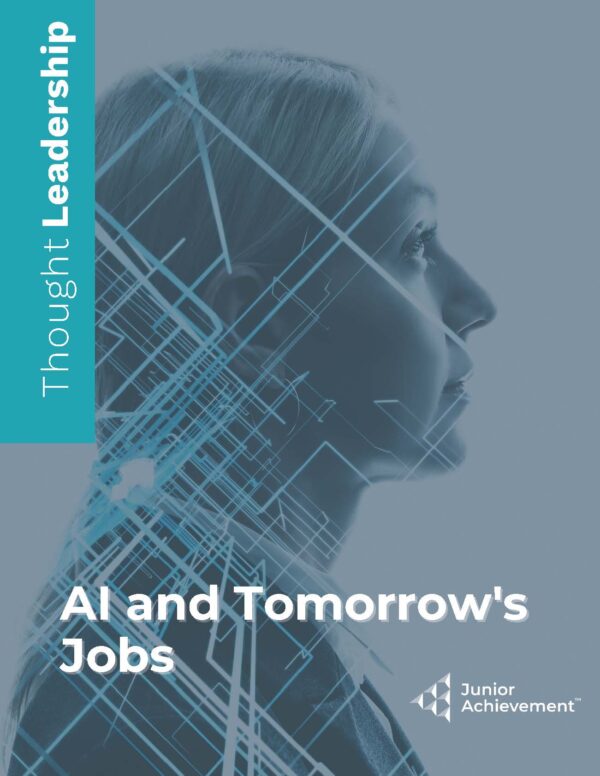By Hannah Henry, Manager of Marketing & Public Relations, Brand
Junior Achievement USA
A survey conducted by Gallup and Strada Education Network revealed that 36% of those who attended college regret their choice of major. Of those who pursued or completed a bachelor’s degree, findings uncovered that 40% would pick a different field of study. That’s roughly $25,000 a year, for a student who is in-state attending a four-year university, to decide that their degree was not the best choice for them.
According to Mark Danaher, a career counselor at Newington High School in Newington, Connecticut, “My feeling is that high school students don’t have to know the exact career they want, but they should know how to explore careers and put time into investigating them and learning about their skills and interests.”
At 18 or 19, we are expecting teens to know their career-path and putting a hefty price tag on pursuing what they believe is the right option for them. But, are they being given all their options? All the while, some teens may not be exposed to alternatives outside of attending colleges, such as vocational schools.
To assist in the discovery of which path is right for you or your teen, here is an overview of how trade schools could be the perfect fit!
The Difference Between Trade and Vocational Schools
Vocational and trade schools are similar in nature as they both offer an accelerated path to get into a specific career. While most use them interchangeably as an educational institution that teaches individuals for a particular skill set, some identify them as having smaller differentiations. According to the U.S. Department of Education, technical schools teach the theory and science behind an occupation, while vocational schools may take a more hands-on approach to teach skills.
The Unique Perks of Attending a Trade School
Unlike traditional colleges, trade schools focus on one specific area of “trade” learning. This hyper-focus on a specific skill enables trade-schools to offer smaller classrooms with more one-on-one learning opportunities for the students. Additionally, vocational schools educate students of industry-specific rules and regulation, as well as real-work experiences to enable them to get familiar with the type of work they are pursuing.
The amount of time it takes to successfully complete trade school is another perk to this vocational path. While programs vary, vocational training can go from as little as ten weeks. In turn, this makes this educational career path highly appealing to those who are seeking to get into a profession as soon as possible.
With the unique benefits of vocation schooling, this route isn’t just for those who have graduated high school but also for those who are planning to enter a specific industry for the first time, reenter the workforce, and for those who are seeking to change their career path. The diversity amongst trade school students enables them to network and learn from one another, creating an inclusive learning environment.
Current Demand for Skilled Trades in 2019
A large majority, 70%, of construction companies across the country are having trouble finding qualified workers and construction isn’t the only industry suffering. It is estimated that every day for the next decade, 10,000 baby boomers will be reaching retirement age and will be leaving specialized positions in which fewer workers can fill. Luckily for trade schools, their robust skill-focused programs offer a bright future. Careers that will be experiencing more and more demand for skilled labor include:
– Carpenter
Total new job openings: 83,800
Average salary: $51,120
– Plumber
Total new job openings: 75,200
Average salary: $58,150
– Electrician
Total new job openings: 59,600
Average salary: $59,190
Click here to explore possible career paths!
Think the trade-school path is right for you? Click here to learn more!
Program Introduces High Schoolers to Career Paths, Including Skilled Trades
Junior Achievement of South Florida offers its program JA Career Bound to high school students in South Florida. JA Career Bound is a cutting-edge, skills-building leadership program where participants learn the skills necessary to succeed in today’s workforce.
After an opening retreat, students meet once a month for program days focused on specific industries. Students visit some of South Florida’s premier businesses to learn firsthand about the career opportunities and what companies are looking for in future employees. Students learn from top executives who share their journeys to success.
We use interactive JA curriculum to teach key work skills, including communication, critical thinking, goal setting, interviewing, personal branding, problem-solving, public speaking, resume building and teamwork. At the end of the year, students will have the opportunity to put their skills into action by participating in various paid internships with job shadowing. For further details, including registration, CLICK HERE.




